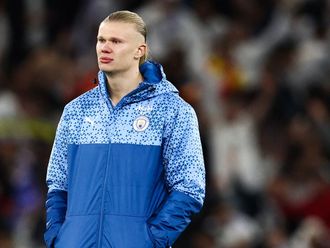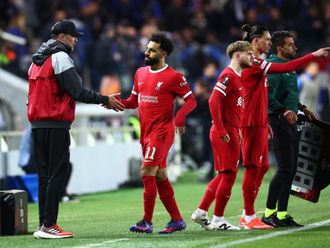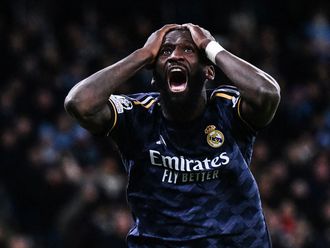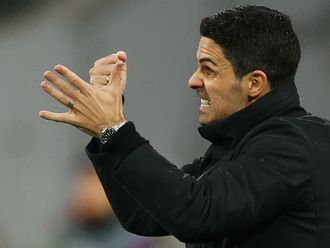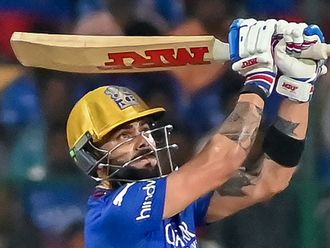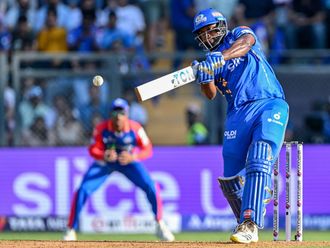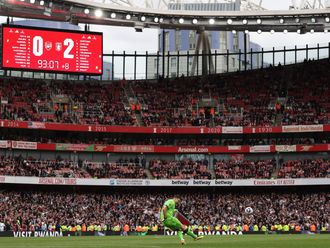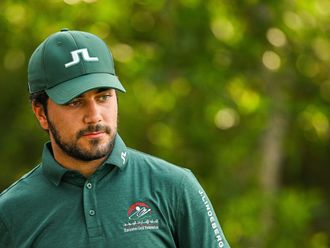London: It was the night of the 2010 World Cup final and Arsene Wenger was walking into Soccer City, Johannesburg, heading up the curving public ramp to the commentary positions.
His journey was delayed by spectators, some wanting autographs, others photographs, all wanting to pick his distinguished brains. How would Holland cope? How wonderful were Spain? Had he enjoyed South Africa?
Step after step, question after question, respectful fan after fan from a range of nations. Arsenal’s manager dealt politely with the requests.
Many of those in the public eye acquire the skill of keeping moving while signing, smiling and posing for pictures.
Wenger stopped, happy to engage, listening to others’ views as well as generously giving his own.
By chance, I had encountered Wenger arriving at the ground, and accompanied him for a while, seeking his reflections on the tournament. As did a legion of others. I remarked to Wenger about his admirable patience when the clock was surely counting down to a television programme and his expert pundit’s chair was still empty.
Wenger explained he had left his hotel early, partly because of his meticulous nature and also because he knew fans would want to talk.
This charming man did not want to appear rude and disappoint people. So an element of cool-headed analysis should be introduced into the current frenzy over Wenger, a 3-1 defeat to Aston Villa and his travails in the transfer market.
Not because he is courteous to punters but because the Frenchman is one of the most revered managers around through his work over three decades. He is held in esteem not only in France, Japan and England, where his club coaching career has taken place, but elsewhere around the world.
Respect
Wenger has earned respect. He has earned the right for discussions about his future to be conducted with intelligence, not pitchforks. He can still prepare a team well. He still represents a great club with decorum. Clear-eyed, rather than bloodshot focus on the Wenger situation reveals that this is a manager who needs help in the transfer market.
It is sad but true: the man who built the Invincibles has become a ditherer when it comes to signings, has become far too hesitant at closing a deal. He prevaricates when scouts come to him with targets.
He hates overspending even if it is the only solution. If Wenger looked to bring in a new tea-lady, he would be torn over one sugar or two.
Player representatives, whether agents or lawyers, confide frustration at being kept waiting for Wenger to make a decision when they have got other clubs not only on speed-dial but on hold, seeking to conclude negotiations.
Nobody should weep for agents but Arsenal fans should weep at the missed opportunities, the number of players who moved elsewhere while Wenger dawdled. Rather than dithering themselves, Arsenal’s board need to address the situation, understanding first why Wenger has lost his touch in the player-recruitment business and secondly installing a proper structure for spending and seeing deals to fruition.
The reasons for Wenger’s stagnation are varied. He misses the nudging presence of his friend David Dein. He takes his famous perfectionism in doing background checks on potential signings to extremes, an understandable stance but ignoring the reality that other managers move more swiftly.
He has a near-pathological unwillingness to pay a few million over the odds to guarantee the player. The contrast with Spurs this summer is notable; they have moved quicker, making attractive offers to get the deals done.
Etienne Capoue? Wenger looked, lingered and pondered. Andre Villas-Boas and his technical director, Franco Baldini, acted.
If Wenger was more decisive he could have strengthened Arsenal at both ends and would not be travelling so nervously to Istanbul today. Why not make Queens Park Rangers an offer they cannot refuse for Julio Cesar? The Brazil international is a vastly superior goalkeeper to the inexperienced Wojciech Szczesny.
Wenger believes in the young Pole and does not want to inhibit his development. Yet Szczesny could learn from watching Cesar and mature into an able successor long-term. Pursuing Gonzalo Higuain was always going to be an expensive process but Arsenal became distracted by Luis Suarez’s potential availability and ended up with neither.
Their £40,000,001 (Dh229,867,000) offer for Suarez, which they smugly and naively thought would trigger a phantom release clause, was offensive, understandably enraging Liverpool, who became doubly determined to keep their No 7.
Transfer jungle
Wenger increasingly looks like an ingenue in the transfer jungle. Take Yohan Cabaye. Why a bid this late in the window? It hints at a lack of planning, arguably a lack of real regard for the player. Do your business early. Manchester City did. And go in hard and strong.
Arsenal have offered £10 million, which Newcastle United rightly deem “derisory”. Paris St-Germain are lurking. Wenger needed to act more assertively. There is also the question of do Arsenal need a creative midfielder such as Cabaye when they have Jack Wilshere? Cheick Tiote, particularly the early, hungry version, would bring more muscle to midfield.
Cabaye is the type of player Wenger would have spirited in unnoticed direct from France a few years ago, ambitious and reasonably priced. Wenger’s scouting network has not necessarily diminished. Others have improved (like Newcastle’s under Graham Carr) while Wenger’s reactions have slowed at a post-Dein Arsenal. The real flaw at the heart of Arsenal is Wenger’s working relationship with the chief executive, Ivan Gazidis.
Wenger was involved in the appointment of Gazidis, effectively anointing the man who would be his boss. That inevitably skews the balance of power. Gazidis is nice but not particularly tough; a bit like the team.
Wenger needs someone above him who is not in awe of him, who does not, subconsciously or otherwise, feel indebted to him for the job. Officials at the Emirates Stadium must stop tiptoeing around Wenger. He needs to be challenged for the team’s benefit and his own benefit. It does not need to be done aggressively. That is not the Arsenal way. But it does require Gazidis or Stan Kroenke to rethink and reshape their whole buying strategy, appointing a football man to work in tandem with Wenger.
The club missed the chance to bring in Patrick Vieira, to bring in Brian Marwood, Arsenal people now helping Manchester City. It is a familiar lament on these pages: Arsenal do not need to change their manager — yet — but they do need their manager to change his ways in the transfer market.
— Telegraph Group Limited, London 2013


